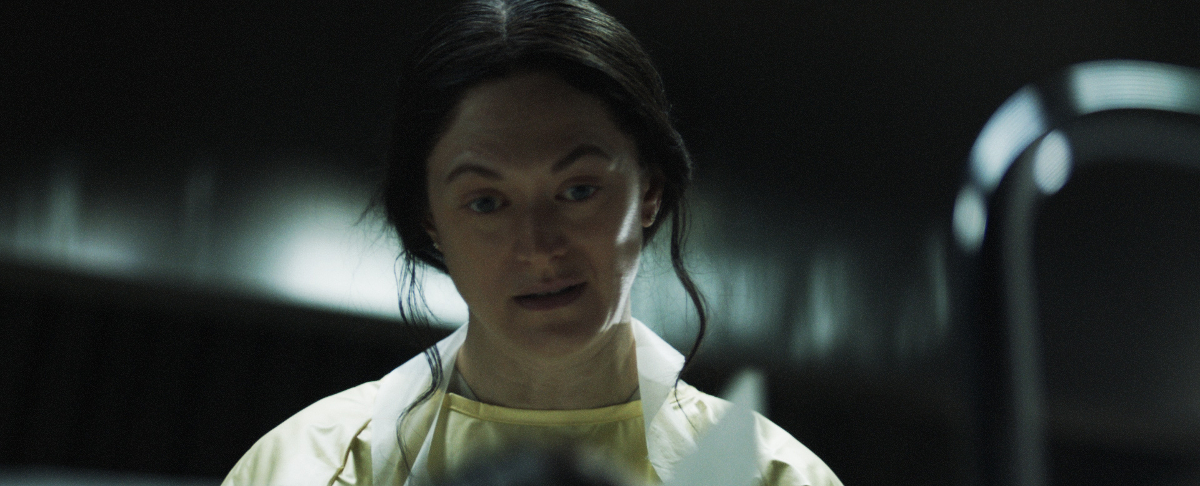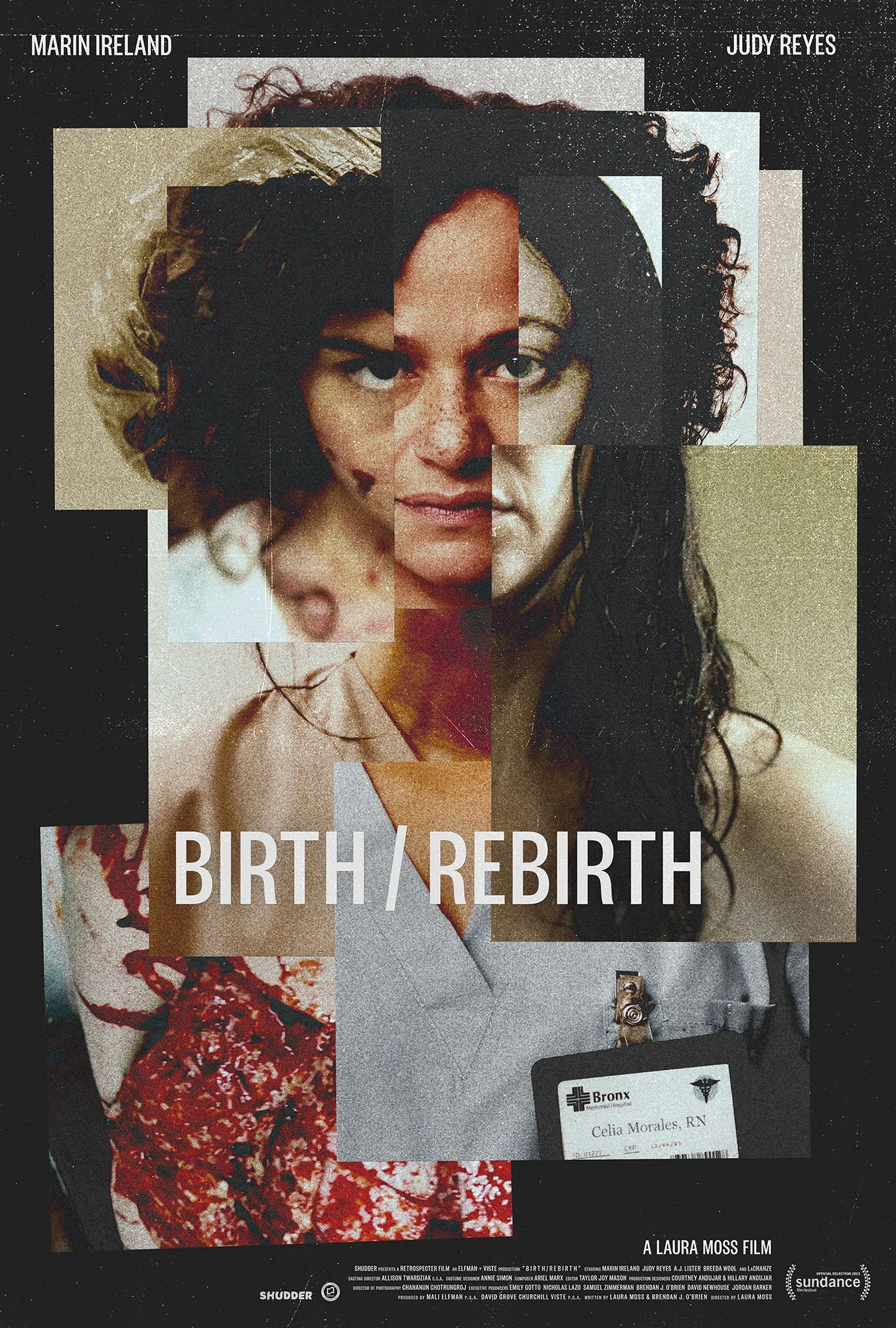Bodies are messy. Women's bodies are especially messy. There are so many phases, and so much can go wrong! There are so many procedures required to make things run smoothly, and these procedures are sometimes painful, placing women at the mercy of medical professionals who treat women's pain with cavalier indifference. (This pain gap has generated a lot of chatter recently.) The pain and stress of having a body subject to the whims of natural (or unnatural) forces is the subject of Laura Moss' riveting "birth/rebirth," where two women merge into a joint Dr. Frankenstein as they attempt to re-animate the body of a dead child.
"birth/rebirth" has some "body horror" tropes and some straight horror tropes, but it's not really a monster story. It's more of a medical thriller, helmed by two twisted conspirators, both operating from a place of desperation and trauma. The tone Moss establishes makes the events seem almost plausible. What if human bodies could regenerate themselves like a starfish does? Is there any way a dead body could come back to life through legitimate medical means?
The two main characters—Rose (Marin Ireland) and Celie (Judy Reyes)—are well-prepared to address this question. Rose works in a hospital morgue, and Celie is a labor/delivery nurse. To call Rose intense is an understatement: she is forbiddingly anti-social and clearly keeping secrets. On the other hand, Celie is raising her daughter Lila (A.J. Lister) on her own and is well-loved by her colleagues. She clearly loves her job. The two women work in the same hospital but don't know each other. When Lila dies unexpectedly from bacterial meningitis, Rose—who has already been performing regeneration experiments in her apartment and has successfully brought a dead pig named Muriel back to life—sees her chance for the ultimate experiment. Rose packs the corpse in a suitcase and brings it back to her mad scientist's lair. When Celie discovers Lila's body has been "lost," she suspects Rose and follows her home.
One of the main strengths of "birth/rebirth" is Moss' resistance to the expected. One might expect Celie to be outraged at what Rose has done. One might expect the film to unfold as a battle of wills: Rose fighting to keep her experiment going and Celie attempting to thwart it and rescue Lila for a proper burial. One might expect Lila to "re-animate" as a monster, turning on her saviors with murderous violence. But ... none of that happens.
Instead, we get the absurd spectacle of Celie and Rose, medical professionals, teaming up to work on the experiment. Celie moves in with Rose. They take shifts watching over the dead child. They rush out the door to their real jobs. They pack lunches in the kitchen. Muriel, the regenerated pig, snuffles in the corner, and Lila lies in bed, her skin a purplish hue. Since fetus cells are needed to make the essential serum, Celie uses her position at the hospital to acquire it through dishonest—and, frankly, monstrous—means. Even more terrible is the glimpse of how Rose got those fetus cells before Celie, the maternity nurse, came along. It involves unwitting men, bar bathrooms, globs of collected sperm, and syringes. It's gruesome, but not half as gruesome as how Rose handles her eventual pregnancies. Much of this is stomach-churning, but the subversiveness of "birth/rebirth" is that almost everything shown is an everyday medical procedure, procedures women endure every day in the normal world. The physical demands of having a body, of getting pregnant, bringing a pregnancy to term, of labor, delivery, infertility, damaged cervixes, and all the rest ... are here, but twisted. These women will stop at nothing. It's a match made in mad-scientist heaven.
Both actresses deliver layered and complex performances. The film is often funny, one of the many ways Moss allows for the unexpected. The humor comes from the juxtaposition of what Rose and Celie are trying to do with how matter of fact they are doing it. The dead child lies in bed as the women make lunches, or feed the omnipresent Muriel, or problem-solve each crisis. They make cracks about one another's diet like a bickering married couple. "At least you didn't do anything unethical like eat a ham sandwich," snaps Celie at one point. Celie is all warm and caring; Rose is cold and calculated. Together they make a formidable team. They will use anyone and anything to achieve their goals. In this, they betray the women in their care—dead and alive. Natural biological processes are often very stressful. Nobody knows this better than Celie: she knows the buttons to push with a nervous pregnant woman, and she does.
It's amazing how far "birth/rebirth" goes into this amoral territory. Lila's regeneration is a "miracle," although Rose balks at the term when Celie uses it. This is science, nothing more. The mood established is eerie and mournful, the colors muted and hospital-morgue-green. There are barely any scenes outdoors. Nature doesn't exist in this world. Ariel Marx's score is well-placed, sometimes taking on a light tone, adding to the destabilized atmosphere—the music drones on subliminally in an eerie counterpoint. There are a couple of false notes along the way, where Lila's regeneration seems to be going off the rails, where the supernatural appears to be raising its dead-eyed head. These scenes come from another movie running on "expected" lines.
Two small moments, neither of which center on Celie or Rose, stand out as pointed reminders of the resonances at play in this creepy tale. Early on, Celie assists with a birth. The woman is working hard; the husband stands by supportively. Suddenly the doctor says, "I'm going to perform an episiotomy," and the woman gasps, "Oh, please, let me try to do it myself!" In her plea is every story you hear about women's choices being ignored, their concerns about their own bodies dismissed and overruled. In the second moment, a pregnant woman is in crisis on the delivery table, enduring the chaos of an emergency C-section. The nurse reassures her, "Your baby's going to be fine, I promise you." Good news! The pregnant woman asks foggily, "What about me?" She's terrified. The nurse barely understands the question. What about you? What kind of question is that for a pregnant woman to ask? Who cares about you?
Now playing on Shudder.




















